Jan Carson's Blog, page 7
November 15, 2017
Seven (Very Short Days) in New Zealand
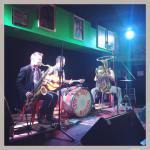
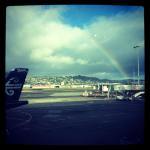
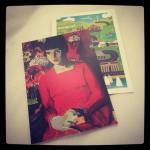
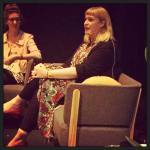


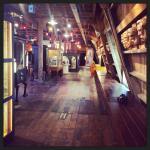

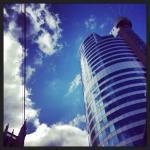
Most people, visiting New Zealand, spend a little longer than seven days. (It does take the better part of 36 hours’ flying to get there, after all). Most people are sensible. They don’t sign up for literary festivals on three different corners of the planet on three consecutive weeks. Not me. I am the queen of packing far too much in, (literally, metaphorically, in this case, geographically), and, when offered a trip to LitCrawl Wellington, sandwiched somewhat inconveniently between a Literary Festival in Norway and East Belfast’s own CS Lewis Festival, which I’m curating this year, I just didn’t have the necessary good sense to say no. I am now wandering round Belfast in a semi-dazed state. I have swollen ankles and a perpetual twitch in my right eye but I regret nothing. I’d jump a plane straight back to Wellington tomorrow if I had the chance.

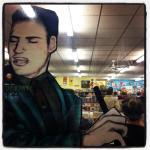
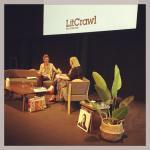

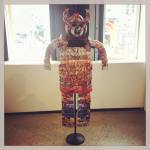
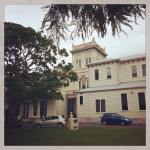
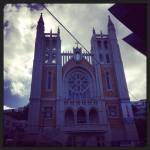
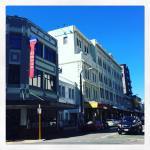
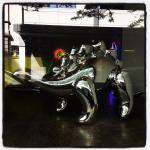
The last week was an absolute dream. I met the most amazing people. I discovered a wonderful new city and was temporarily immersed in its incredible arts community. I pushed myself way out of my comfort zone in terms of my writing and artistic practice and learned an awful lot about how to present my work in a variety of different arenas. I drunk some truly exceptional beer. I am now utterly exhausted but also buzzing with ideas and writing projects I can’t wait to get stuck into. I am trying to curtail my enthusiasm for fear of sickening everyone who comes into contact with me.

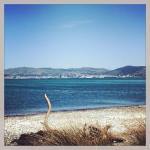
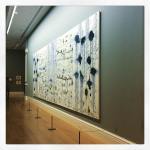
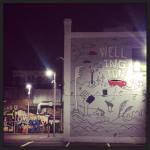

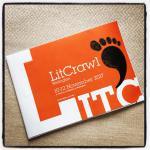

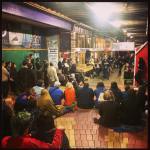
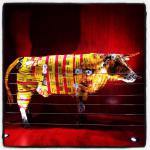
Sometimes people wonder why the Arts Council and other funding bodies subsidise artists to travel to other places. I understand their skepticism. From the outside it can look like we’re being paid to take long extended holidays, in lovely places. I was fortunate enough to receive support from both the Arts Council NI and the British Council for this trip and I can honestly say their financial support has allowed me to enjoy an experience I’d never have been able to resource myself. I can also say, with absolute conviction, that this wasn’t a holiday. Yes, it was enjoyable, but I worked my ass off in New Zealand. I taught five school workshops, gave two readings and a radio interview and hosted a masterclass, all in the space of five days. It was pretty tiring at times and the thought of a mid-afternoon nap was never far from the front of my mind, but I wouldn’t have traded my experience for anything less intense. I’m kind of done with being a tourist when I travel now. Visiting a new place where you become utterly emerged in the culture and community really quickly is the only way to get under the skin of a city. I’m so very grateful to have been given this opportunity.
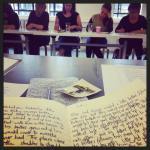
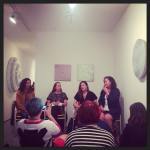
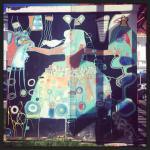
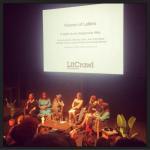
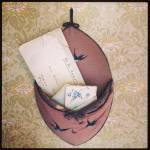


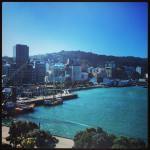

In the last seven days I have made contacts with organisations and festivals who will hopefully offer me future opportunities to travel and share my work abroad. I met other artists whom I hope to host in Northern Ireland and collaborate with on future projects. I got to share my work with an audience I’d never otherwise have reached and host workshops encouraging a bunch of young, and very enthusiastic, writers in schools throughout the city. Most importantly, the experience has really boosted my confidence in regards to my ability to present my work and adapt to the unfamiliar. Every time I get a chance like this I feel a little more like I am a legitimate Writer. I should, by this stage be secure in this role, but everyone wobbles sometimes and it is wonderful to be given a chance to see yourself through strangers’ eyes as a writer first and foremost, but also as representative of the place and culture you come from.

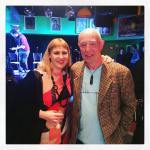


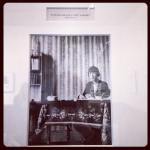
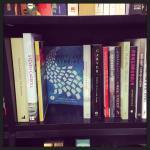
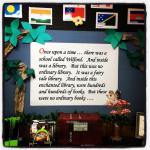
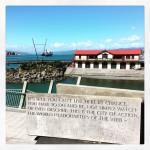
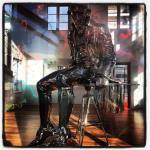
While, a little bit of me hopes that the fact I only stayed a week and consequently never managed to get over my outgoing jet lag, might mean the homecoming jet lag never quite catches up with me, I am so sad that I didn’t get to spend longer in New Zealand. I could easily have spent another few days/weeks/months in Wellington. This was definitely one of my all time best adventures ever, even if it was incredibly condensed. What a tremendously full week. Here are my highlights. (Apologies for the fact it’s a list. Lists come easier when your head feels like it’s not screwed on right and you can only see properly out of one eye).

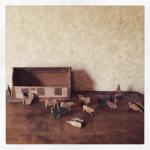

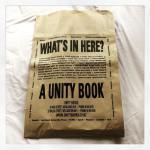
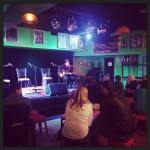




Schools: I had the most amazing time visiting four different Wellington schools. I wrote magic realist Postcard Stories with a bunch of 11-13 year olds and was absolutely bowled over by both their imagination and self-confidence. Clearly the teachers in New Zealand are on to something because their kids had no problem at all making up stories about talking dogfish, children trapped inside Chinese lanterns and haunted textbooks. Working with these young people was an absolute tonic. I was particularly impressed by the 11 year old who tracked me down after the workshop to ask for my agent’s number so he could get his novel published and the 9 year old girl who is so set on being a writer she was allowed to sit in on the big kids’ workshop, wrote the best story in the class and read it with incredible confidence in front of 30 much older students. I am kind of jealous of her.
Schools 2: I was using the story of Finn McCool to share a little bit of Ireland’s mythology with the students. On several occasions I was treated to really beautiful retellings of Maori legends where all the kids chipped in to tell the full story of how their landscape was formed. I’m not the sort of person who gets particularly gushy over folklore and mythology but the swapping of these, oftentimes, very similar stories from two very different cultures was one of my favourite New Zealand moments.
LitCrawl: LitCrawl happens in lots of different cities around the world. In Wellington it looked like 26 short literary happenings taking place in around 12 different venues across the city over a period of about 3 hours. Hectic. Somewhat overwhelming and absolutely wonderful. I got to read and talk at a Bob Dylan themed event and then spent the rest of the evening ducking in and out of bookstores, record shops and bars, listening to all sorts of wit and wisdom. I think we really need a LitCrawl in Belfast. I feel a project coming on.
Earthquakes: I experienced my first tiny earthquake on Sunday evening just before I left Wellington. It was only a 4.2. All it did was make the water bottle judder off my bedside table, but as I was right in the middle of watching the final episode of Stranger Things it felt pretty weird and creepy. I’m quite happy if this remains my one and only experience of earthquakes.
Bookstores: There are about a million bookstores in Wellington. They are all fantastic. Particularly the ones which are enormous and only stock second hand books. Consequently I spent a fortune and nearly broke my back hauling all my purchases home.
Like minds: New Zealand writers are brilliant. They are very much similar to Irish writers, (ie. self-deprecating, talkative, fond of beer and black humour, much more talented than they let on). They are also incredibly friendly and it only took me about 5 minutes to make a bunch of new pals and to track down the two, (wonderful), women who write about Dementia. I see collaborations in our future, and hopefully some hosting opportunities here in Belfast.
Radio: I was able to do two radio interviews in New Zealand. Both were almost half an hour long and it was pretty clear the hosts had done an awful lot of research as the questions they asked were exactly the kind of questions I always hope people will ask in interviews. I was also surprised by how many people came to my events just because they’d heard these radio interviews. A country where people still listen to the radio is, in my opinion, a very progressive country.
Katherine Mansfield: My lovely host Claire, very graciously took me to Katherine Mansfield’s house and it was wonderful. I now have a much clearer idea of the places she wrote about in her stories. I am, if anything, a bigger Katherine Mansfield fan than I was before and will be hoking out her collected for a re-read asap.
Lovely audiences: I got to read my own work in front of around 100 people on Saturday afternoon. I only knew two people in New Zealand when I arrived and one of these two was Lyndsey who was visiting from Cheltenham. I was pretty much astounded that anyone turned up to hear me and the warmth of the audience both during and after the reading was really humbling. It’s always a massive encouragement to get positivity back from an audience, but to have such a lovely experience with a bunch of strangers was just incredible.
Women: Hats off to Claire Mabey, she’s a great programmer. She put together a wonderful series of reading showcasing the best of New Zealand writing, with a great range of diverse voices, but the thing which really struck me about LitCrawl and the wider New Zealand literary scene, (and I guess I shouldn’t be surprised by this, coming as I do from an incredible community of strong, female voices), was just how many incredible women are involved in literature in New Zealand. I met poets, prose writers, publishers, programmers and a bunch of women who didn’t fit neatly into any particular box and were just getting on with being incredibly inspiring in their own way. I’m a much better person for all the conversations and wine I shared with these women in the last week. We have a lot more in common than I might have assumed. I’m hoping to continue some of these conversations really soon.




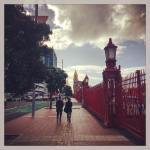

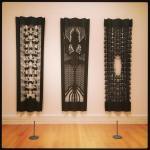




November 13, 2017
Postcard Stories from New Zealand
[image error]
6th November 2017
Olive Broderick
Auckland, New Zealand
When he first sat down to catch his breath at the end of the pier George did not know that he would never again stand up. In the early days he was content to watch the seagulls coming and going like white kites coasting against the ocean breeze. It was almost summer. Not too hot. Not too cold. The sunshine was pleasant prickling against George’s skin. When winter arrived he found he could not stand up. It wasn’t his bones or muscles refusing him so much as his interest in being anywhere but here, at the end of the pier, staring out to sea. The locals brought him food. The locals kept him company for hours at a time. When the hard rains started to pelt down upon George’s head, the locals built a roof and four walls around him – a little house to offer some protection from the elements.
George continued to sit and stare at the horizon. He ate three decent meals a day and, like a pond-locked goldfish, swole to meet the limits of his confines. When, in the spring of his third year sitting, he took a notion to stand and walk away from the spot which had served him so well, George found he couldn’t. The roof they’d built above him was too low to accommodate his standing frame, the door so small, it might as well have been a wall. George had no choice but to continue sitting. He could only presume there was something to be learnt from all this contemplation.
7th November 2017
Paul Maddern
Auckland, New Zealand
You hear the same story told several different ways whilst staying in Auckland. You suspect the story may not be true but choose to believe it anyway. It is such a good story. Around twenty five years ago, (or two summers ago, or one time in the early 70s), some University of Auckland students, (or a fun-loving, local entrepreneur, or a bunch of regular, teenage boys), planted burning tires, (or fireworks, or one enormous Catherine Wheel), in the inverted hollow of Mount Eden, a dormant volcano on the outskirts of the city, (it should be noted that the geography never once changes in the telling). When Auckland’s residents awoke to find plumes of angry, grey smoke emerging from the hill they naturally assumed that the volcano was about to erupt and fled the city in frenzied droves, causing gridlock on the freeways and coastal by-roads. As you said, there are umpteen different versions of the fake volcano story floating round this city, but the punchline is always exactly the same.
8th November 2017
Orla McAdam
Wellington, New Zealand
Here is a nine year old girl. Her name is Ella. She says she wants to be a writer when she grows up. You say, “you are already a writer, Ella.” You point to the story she has just written and read aloud in front of thirty twelve year old boys. Ella has written a story about a talking dogfish. The dogfish has gone shopping in Wellington city centre. It wants to buy some fancy going out clothes, something really ‘oosh’ which is the word the kids are currently using for cool here in New Zealand. The dogfish goes click clacking from one boutique to the next in high heeled shoes. (Click clacking is the exact phrase Ella uses in her story). Eventually the dogfish purchases an outfit of invisible clothes and disappears. (It is much more dramatic the way Ella tells it).
You are jealous of Ella and her impossible imagination. You wish you were her at nine, or any age really, writing stories about high heeled dogfish, reading these stories aloud in front of boys. You can’t be Ella though. You are too old and self-conscious. So you steal her story instead. (You have told the children it is alright for writers to steal ideas). You still feel a little guilty though, a little like you are letting Ella down.
9th November 2017
Reidunn and Odd Henning Johannessen
Wellington, New Zealand
Belfast versus Wellington. Both are cities clawed back from the sea. In Belfast the ocean once ran all the way up to the Crescent Arts Centre which was not an arts centre back then so much a primordial swamp and possibly a collection of scrubby trees. Everything North of this is slowly sinking. Note the Albert Clock, lilting as it is, gently to the right, a prime example of Belfast’s inability to keep her own head above water. Not so much Wellington which was once submerged and then suddenly land rich. Blame an overnight earthquake for the roads and pedestrianized streets which now grid the city into a checkerboard. Note the skyscrapers which the locals have built: twenty storeys into the air, occasionally thirty. Compare to Belfast which won’t build higher than ten storeys up for fear of bombs and bombing factions long since silenced. Ask yourself why the people of Wellington aren’t more wary of a second earthquake, if they are braver than the people of Belfast, or just more optimistic?
10th November 2017
Team No Alibis
Wellington, New Zealand
Paddy the Wanderer was an Airedale Terrier who lived in the Waterfront area of Wellington during the 1930s. Having lost his owner early on, the entire city conspired to adopt Paddy, driving him to and fro in taxi cabs, allowing him to sleep in their sheds and boathouses, even permitting him to jump ship and sail as far away as mainland Australia. Once -pre-empting the Russian space dog Laika by a good few years- Paddy actually took to the air in a bi-plane flight around the Wellington hills. He is said to have enjoyed this experience immensely. Never happier than when in transit, Paddy lived to almost thirteen and when he finally succumbed to old age, made his final journey to the city crematorium in a small dog coffin, paraded through Wellington’s streets by a whole fleet of grieving, black taxis. Upon hearing of the little dog’s death, one heartbroken waterfronter is said to have muttered, “I’d give a month’s pay to have Paddy back.” The people of Wellington later erected a statue in memory of Paddy though with hindsight it seems somewhat problematic to have memorialised the Wanderer in such a static fashion.
11th November 2017
Andrew Meehan
Wellington, New Zealand
Most of Peru is under your window, playing trumpets. The noise of this is like cutlery being dropped from a great height. The Peruvians say they are here for the soccer. They say they’re using this World Cup Qualifier as an excuse for a vacation. But you know better. You lie in your hotel bed, not sleeping, on account of all the trumpets, and you begin to discern a pattern behind the music, (though really it’s not so much music, as shouting with instruments). Here is a snippet of “Hark the Herald Angels.” Here, the briefest sliver of “Joy to the World,” and “Jingle Bells,” like a constant refrain looping in and out of all their frantic hollering. You crawl out of bed and peek through the curtains. Three floors below the Peruvians are dancing around the alleyway like creatures possessed. Their red hats, red sweaters and red flags bloom in the dark. Their bright faces are painted a jolly, festive red like Santa’s slightly inebriated helpers. “Soccer my arse,” you think. “This lot are here to infect us all with Christmas.” And you don’t mind this at all. You are a big fan of Christmas. Just not at two in the morning, on the first weekend in November.
12th November 2017
Damian Smyth
Wellington, New Zealand
Last November, just six hours after the Wellington Lit Crawl finished, a medium-sized earthquake took the city by the scruff of its sky-scrapered neck and shook it hard. It would be nice to imagine that the weight of so many bookish souls rushing earnestly from one poetry reading to the next had caused this upset, shaking Wellington all the way down to its earthy core. But this would be naïve. There are often tremors here: both enormous tectonic shifts and lesser, barely discernible shudders, so light and self-possessed it is like the buildings are merely shivering in the midwinter drizzle. Still, it is interesting to note that this –hot on the tails of a literary festival- earthquake brought the wall down in Katherin Mansfield’s garden. Yes, the very garden which set the scene for her seminal short story, “The Garden Party,” was all of a sudden ruined by split bricks and torn ivy, rubble clumping up the chrysanthemum beds. One year later and this wall has not been resurrected. Katherine Mansfield’s front garden has lost all modicum of privacy and, suddenly liberated, her stories have made a break for it, rushing down the hill, into Wellington city centre, where they are infecting everyone they meet with their dark beauty. Consequently, this year there are even more bookish souls rushing earnestly from one poetry reading to the next. The name for this phenomenon is not an earthquake so much as an avalanche.
13th November 2017
Andy Linton
Doha Airport, Qatar
Peter had always wanted a little brother. Sisters were fine but they weren’t interested in kicking football or racing snails or anything involving mess. When Michael was born, Peter was delighted- a brother to play with at last. “Wait ‘til you see, the pair of youse’ll be joined at the hip,” said his father, and Peter smiled, imagining his little brother following him round the playground, copying all his big boy antics.
Little did Peter know his words would turn out to be prophetic. By the time he turned one, Michael was literally stuck to Peter. Joined at the hip. Shoulder to shoulder. Glued together by their conjoined hands. Wherever Michael’s flesh met Peter’s it seemed to catch and stick. Their mother would spend hours each evening prising them apart with a fish slice. The separation always stung, smarting like a ripped off Band Aid. Afterwards both boys would be left with deep red welts where their flesh had been stretched raw.
Naturally Peter came to resent his sticky, younger brother. By the time he’d turned three, he could not stand the sight of Michael and would go out of his way to avoid making contact with him in the house or garden. Later, when his brother grew out of his clingy phase, Peter would come to miss the closeness they’d once known. The places where they’d been joined together –shoulder to shoulder, hip to hip, palm to sweaty palm- would throb like phantom limbs and Peter understood this feeling to be a very specific form of loneliness.


November 12, 2017
Traveling Tips from a Hopeless Traveler
[image error]
Everyone knows I’m not the World’s best traveller. There was that one time I turned up at Bristol airport when I should have been in Birmingham. Then, the two times I turned up for a flight that was booked for the next month, (nb have always had trouble remembering that July is month number 7 when booking tickets. July seems much more like a number 6 sort of a month to me). The infamous time I turned up at Dublin airport with the wrong passport and missed my flight to America and, as a result, missed Mike and Jesse’s wedding, (sorry about that guys). The numerous times I’ve had to sleep in airports, (Amsterdam, Luton, Bristol, Dublin, Luton again), due to a mixed bag of circumstances: some bad luck based, mostly my own stupidity. Also all the things I’ve managed to lose in transit, (passport, Collected Katherine Mansfield, red tartan scarf, laptop with entire unbacked up manuscript for my next novel, many, many individual gloves). Yes, it is safe to say I am pretty unfortunate when it comes to getting from A to B and yet, this year I have ended up spending around a third of my waking hours away from home. I am traveling a lot. I don’t need to tell you this. You can see it in the enormous grey bags semi-permanently looming beneath my eyes.
Right now I’m in New Zealand. I leave for home tomorrow. I’ve been here for a whole six days. I came from Norway and before that Belfast, though I’ve also been in Birmingham, Bristol, Cheltenham, San Francisco, Portland and Salt Lake City during the last month. My inability to travel well, seems to have morphed into an inability to function properly when abroad. I am currently wearing a mixture of the top half of my pyjamas and a number of not very clean items of clothing turned inside out to convey the air of cleanliness. I packed so badly for this trip I actually run out of socks six days in to a twenty day adventures. I have, however managed to pack so many hardback novels my back is permanently throbbing from lugging this ever-growing haul from one airport terminal to the next. I’m not great as this traveling malarkey, but the next phase of my life looks like it will involve a lot of being away from home so I’m trying to learn from my own mistakes and tighten up my game when it comes to jet setting. I am hopeful that I will soon have worked out a formula for calculating just how many pairs of socks I will need for X amount of days spent in various different climates, and I will learn how to sleep when lumbered with the middle seat in a plane aisle and I will develop the miraculous ability to resist ordering pancakes for breakfast every day, simply because pancakes are an available option. For what it’s worth, here are a few hard learnt lessons from my last six months on the road. Please feel free to learn from my own, (mostly self-inflicted), mistakes. Happy travels everyone.
1. The combination of two large glasses of red wine and a spot of Melatonin is enough to render an elephant comatose for about eight hours. (Eg. partake of said remedy half an hour out of San Francisco, wake up ten minutes from the runway in Dublin with no memory of the horror inbetween).
2. Always keep your passport/tickets/important documents in the same pocket. This will help to avoid that standing at the check-in desk, unable to locate your passport, stomach lurch of a feeling I have grown oh so very accustomed to. (Nb. The back pocket of your jeans is not the most reliable storage spot, unless you want to leave a trail of important documents behind you every time you sit down).
3. Use the completely useless mini pillow they give you on long haul flights as a rest for your feet. While, nothing short of swaddling in circulation constricting bandages can entirely stop your feet from swelling up like enormous sausages, this will help to cushion your heels against the plane’s vibrations and might even mean you can actually get your shoes back on after a 16 hour flight.
4. Drink as much water as you can. Drink less water if you are not seated in an aisle seat. Water consumption is directly related to how often you will need to empty your bladder/clamber over the sleeping Germans seated next to you. There’s a fine line between hydration and pissing off your fellow passengers.
5. Be careful who you talk to. Sixteen hours is a long time to be stuck next to a complete stranger, and whilst traveling solo can be a strange and oftentimes lonely experience, and it might have been up to twenty four hours since you last said anything more meaningful than, “I’ll have the chicken please,” to another human being, prematurely instigating conversation with the person seated next to you can leave you trapped in a very long version of that, “oh you’re Irish. My family is originally from Ireland,” conversation, every legitimately Irish person abroad has come to know and loathe. I recommend resisting all forms of communication including eye contact. It is better to appear surly and unapproachable than spend the better part of a day listening to how a complete stranger once visited the Cliffs of Mohr.
6. It is perfectly ok to watch any old crap while trapped on a plane. Terrible movies starring Tom Hanks. Frat boy comedies. Romantic rubbish with that girl from The Princess Diaries. The sky is like a different kingdom where the normal rules of taste and decency do not apply. Exploit this for all it’s worth and afterwards pretend you spent your in-air viewing time catching up on subtitled world cinema and old episodes of Seinfeld.
7. Do not purchase a Kindle: it will seem very tempting and/or sensible to buy some sort of E-reader when traveling. Logic will tell you consolidating all your inflight reading material into one hand held reading device will be a lot more convenient than lugging twelve hardback novels half way round the world. Logic will be wrong. Kindles are never the answer. Kindles kill booksellers and cannot be arranged in a satisfying alphabetical order along a bookshelf. You will thank yourself later for not taking the moral high ground on this one.
8. Do not eat the complimentary bread rolls. They are not like normal bread rolls. They are made of concrete and despair and will sit in the pit of your belly, like a fist-sized brick for up to six weeks after consumption.
Normal
0
false
false
false
EN-US
JA
X-NONE
/* Style Definitions */
table.MsoNormalTable
{mso-style-name:”Table Normal”;
mso-tstyle-rowband-size:0;
mso-tstyle-colband-size:0;
mso-style-noshow:yes;
mso-style-priority:99;
mso-style-parent:””;
mso-padding-alt:0cm 5.4pt 0cm 5.4pt;
mso-para-margin:0cm;
mso-para-margin-bottom:.0001pt;
mso-pagination:widow-orphan;
font-size:12.0pt;
font-family:Cambria;
mso-ascii-font-family:Cambria;
mso-ascii-theme-font:minor-latin;
mso-hansi-font-family:Cambria;
mso-hansi-theme-font:minor-latin;
mso-ansi-language:EN-US;}
9. Bring easy to read books in your hand luggage. I once very earnestly hauled a copy of Faulkner’s “Absalom Absalom” all the way round America, telling myself lack of other reading material would force me to read it. I still haven’t read “Absalom Absalom” but I did end up buying an awful lot of crap in airport bookstores. (Insert similar story about Iris Murdoch/Kafka/Thomas Pynchon).


November 5, 2017
Postcard Stories from Norway and other in-between places (November 2017)
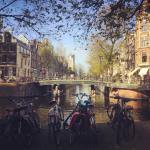
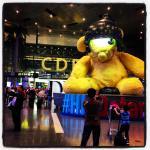




29th October 2017
Anna Murray
Dublin Airport
Chris and Michael are up at the crack of dawn and on the airport bus to Dublin for the marathon. It is not their first time running the Dublin marathon. Last year they place somewhere in the high 500s; the previous year, a somewhat disappointing 763rd and 764th, (Chris being marginally slower than Michael). This year they are determined to do much better. They are almost entirely muscle from running practice laps of Castlewellan country estate. They have eaten half a dozen particularly fibrous bananas each. They are air-cushioned, lycra-clad, lubricated and well-hydrated. They have a plan. Chris will chase Michael through the streets of Dublin howling like a Baskerville hound and Michael, being absolutely shit-scared of dogs –even the tinier breeds- will run like a man possessed, will hit personal best, will possibly even place with the Kenyans. It is a foolproof plan so long as Chris’s voice holds out and Michael doesn’t freeze in proper fear; so long as Chris doesn’t stop to ask why Michael is always the one who gets to win.
30th October 2017
Rozz and Simon Lewis
Skudneshavn, Norway
Norway is littered with standing stones like huge, blunt tongues protruding from the boggy earth. They are flatter than the Irish dolmens, thinner and more pointed. They do not look capable of withstanding a strong, Atlantic gust or even a decent shove from a passing drunk. There are five of them standing beneath the bridge –supposedly the stone struck remains of beautiful, but winsome, local girls- three, triangled in the middle of the roundabout by the petrol station, and one in the graveyard, leaning at a particularly jaunty angle. This, you are told, is known as the Virgin Mary’s Sewing Needle. Local legend claims that Armageddon will be ushered in the very second its tip makes contact with the church’s gable wall.
The end of the world is clearly imminent for there is barely room to pass a flat hand between the stone’s flinty head and the closest brick. Up close you can see where a series of long dead priests and fearful parishioners have tried to chip away the topmost part of the needle. There are marks in the stone where they have missed their target and left scars. You imagine these grim-faced ancient balanced on ladders, hanging from ropes, attempting to wedge their hand-hewn chisels between this world and the imminent next and you are jealous of them. You too would like some solid to rage against.
31st October 2017
James
Haugeslund, Norway
Norwegian trolls only come out at night. By day they disguise themselves as small, grassy hills, curl up, and doze quietly in fields and suburban gardens. This explains how my husband and I, being English and therefore unfamiliar with Norwegian folklore, happened to purchase a large troll along with our new bungalow. The Estate Agent had not bothered to tell us that the grassy mound at the bottom of our garden would unfold every night around eight and come lumbering through the flowerbeds to eat our chickens and leave muddy pawprints on the double glazing. Did the neighbours warn us that trolls were common in this particular part of Norway? Did they Hell? The neighbours were just glad the big bugger wasn’t sleeping in their garden.
When the problem became too large to ignore, (dead cat, ruined shrubberies, a shattered windscreen on my husband’s Volvo), we Googled “how to get rid of a Norwegian troll,” and discovered there was a very simple way to end our trouble. All we had to do was say the troll’s name out loud and he’d immediately disintegrate. We have been introducing ourselves to the troll every night since. “Hello, please to meet you,” we say. “We are the Pattersons. We live, up there, in the bungalow. We should we call you?” But the troll does not seem to understand English and we find Norwegian impossibly hard to pronounce.
1st November 2017
Katy and Peter Martin
Karmoy, Norway
When he realised that he had become a small dog the eminent Norwegian author, Leon Sivert was initially amused. He had always prided himself on his ability to populate his novels and short stories with believable and reasonably interesting characters and was hopeful that this new experience might serve as a valuable opportunity to exercise creative empathy. Afterwards Leon Sivert would undoubtedly be a better writer of authentic canine characters. He felt sure this would only be a phase lasting a day, a weekend at most. Leon Sivert was a Norwegian, stoic by nature, and inclined to make much of even the bleakest situations.
One week later Leon Sivert was still a Welsh terrier. He was no longer stoic, no longer inclined to seek out the silver lining. He longed for clothes and the comfort of a sprung mattress, the taste of something which was not raw meat or marrow. Driven a little desperate he snuck into the local library, padded straight to the adult fiction section and, using his mouth and paws, carefully removed every Leon Sivert book he could find, arranging them in a wide circle on the library floor. Then, he lay down in the middle of is own novels and short story collections and tried to look intelligent. He was hoping some discerning passerby might see the likeness, make a wild leap of imagination and understand his predicament.
This was not to be. A junior librarian found Leon Sivert a half hour later and immediately shouted over to her colleague, “come quickly! Look at this little dog lying on all these books. Isn’t he the image of Leon Sivert? He must be the author’s dog. They do say dogs begin to look like their owners, don’t they? Particularly the dogs of older men.” Then she threw Leon Sivert out into the damp streets for dogs were not allowed in the library, not even those dogs who bore an uncanny likeness to famous authors.
2nd November 2017
Carole Kane
Skudneshavn, Norway
The village of Skudneshavn is perched on the farthermost edge of Karmoy Island, surrounded by forests, ocean and scrubby, mountainous terrain. The road to Skudneshavn is twisted ribbon of a thing, so thin in places that one car must pull aside to make room for another. It is not uncommon for deer to emerge from the forest and pitch themselves across the road, their thick winter pelts blurring in the wind. Though they are all grace and smudged softness as they arch across the asphalt, there is nothing meek about the sound they will make when colliding with a car bonnet or windscreen. The people of Skudneshavn know to take each bend slowly. They peer into the darkness, anticipating the next set of headlights, sweeping across the horizon. Their feet permanently hover between the brake and the accelerator, never prepared to commit fully to either. They do not have the luxury of streetlights here. Most nights they do not even have the moon.
And so it is like a sort of epiphany to round the last dark bend and come upon so many unexpected doll houses, white and stacked one upon another like the tiers of a wedding cake. Each one is poised on the shore’s edge as if waiting to dip its wooden toes into the brine. And, it is a second kind of gift to have driven here on a full moon night, to witness all these pale houses glowing in the good, winter light, like happy, ghost homes for happy, ghost people.
3rd November 2017
Gabri Peroni
Oslo, Norway
In the early 70s the innovative Norwegian artist, Olaf Per-Ercksson struck upon a particularly creative idea for an art installation to be erected in his home city of Oslo. He called this piece, The Invisible Museum. It opened in early summer 1972 and included a world-renowned collection of Norway’s finest contemporary artists. For several years after its opening, travel guides and airplane magazines cited The Invisible Museum as Scandinavia’s number one tourist attraction and, when the Internet rose to prominence at the turn of the last century, the museum’s website was amongst the most popular in Norway. School children and students often utilized its extensive catalogue of exhibits, (past, present and future), to compile history of art papers and power point presentations.
It should be noted that every Norwegian in the country – plus many foreigners who had had settled there on a long term basis- understood Olaf Per-Ericksson’s artistic vision. The Invisible Museum did not actually exist. Though clearly marked on every street map of Oslo, and even included on Mapquest and Google Earth, there was nothing but an empty car park where the museum should have been. The people of Norway also became particularly adept at imagining The Invisible Museum. They gave it imaginary walls and windows, a whole army of invisible visitors and a truly kick ass gift shop. They never once considered enlightening the actual tourists who now visited Oslo by the busload. They liked to watch them wondering around the museum’s general vicinity, confused and clutching street maps. They did not feel superior to these people, just more Norwegian, though perhaps this was exactly the same thing.
4th November 2017
Kristen Kernaghan
Amsterdam, The Netherlands
Everyone knows about the little mouse with clogs on going clip, clippetty, clop on various Dutch stairs. The story of the little Dutch mouse who, attracted by an open packet of strawberry Fruitella, snuck into a suitcase in downtown Amsterdam and subsequently flew half way round the world, only to emerge, shell-shocked and more than a little frozen, in a budget hotel room in Auckland, New Zealand, is not quite so often told.
You try to tell the New Zealand customs police that this story is indeed just as well-known in Europe, just as believable as the mouse in clogs nonsense everyone sings to children. You try to tell the police that you did not know there was a mouse hiding out in your last clean pair of socks, that you’re actually reasonably terrified of mice, and spiders, and all small, darting creatures, that you certainly did not mean to bring any European vermin, or, (perish the very thought), diseases, all the way over here, to the New World. You try to look penitent/innocent/appropriately distraught but the mouse is making a mockery of the situation, running loops around the trouser press.
Perhaps, you think, some humour will lighten the mood. “Any second now,” you say, pointing to the mouse, “he’s going to start into the whole clog dancing routine. He is a little, Dutch mouse, after all.” But the New Zealand police do not laugh. They do not even smile. Maybe they do not know the song. Maybe it would help if you sang a few verses for them.
5th November 2017
Hilary Copeland
Qatar Airport
The airport in Qatar contains a Burger King restaurant, a branch of Accessorise, two WH Smiths and, come early next year, a Harrods outlet where passing travellers will be able to purchase shopping bags printed with red phone boxes, and tiny, plush Paddington Bears and, most likely, all manner of expensive crap alluding to the Monarchy. The effect is somewhat disconcerting. Home away from home etc etc.
You arrived at this airport in the middle of the night. You will leave just before 3am so, when you look out of your airplane window, you will be able to see nothing but the same glossy blackness you encountered upon arrive, punctuated by the neon blip of the runway’s lines. You could be anywhere for all you’ve seen of Qatar and, as you only have the vaguest sense of where Qatar actually is, you stand in front of Harrods’ “Opening Soon” posters for almost 15 minutes wondering if the pilot has played some grand trick on you all, if this isn’t just Luton on a really good day.


November 3, 2017
A Week in Norway
[image error]
I’m in Oslo airport, (which is a little like sitting in the future, everything is so sleek and bright and efficient here). A French man, sitting opposite me in the departure lounge is singing to himself with his headphones on. He is very flat and appears to be singing both parts of a duet, doing one part in a high-pitched womanly voice. I really wish he’d shut up. Right now I’d give enormous amounts of money for quiet and a very long nap and maybe a Poirot marathon. I’m pretty wiped out. I’m on my way to Amsterdam and then tomorrow I’ll hop another plane, (and another plane, and another plane), and eventually end up in Wellington, New Zealand for another week of workshops and readings. Did I mention that I’m pretty wiped out?

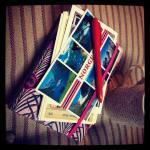
It’s been a whirlwind of a week in Oslo, lots of new experiences and lots of new friends. I’ve had the most amazing time but it definitely hasn’t been a holiday. Like most of these book trips, you only really find out exactly what you’re going to be doing when you’re in the middle of doing it. So, despite my carefully laid plans and pre-prepared presentations, a lot of my week has been about adapting to the situation as it happens; trying to assess the expectations and capabilities of a room full of strangers and doing my best to give them something helpful and hopefully entertaining. I’ve been doing a lot of thinking on my feet and a lot of talking, (mostly about Northern Ireland and Magic Realism and Brexit, which is pretty much the new weather, when it comes to finding universally relevant conversation topics abroad), a lot of meeting new people and a lot of eating bread and cheese, (which the Norwegians really excel at). It’s been such a wonderful week and though I’m so tired I’ll probably sleep through all twenty eight hours of flying tomorrow, I wouldn’t change any of it. While everything is still fresh in my head I wanted to jot down a few highlights from a very special week in Norway. (Nb spellings might not be correct. I have been trying but I’ve not quite managed to conquer Norwegian yet).
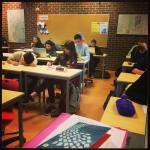

This week I’ve been mostly working in high schools which were situated close to the small island of Karmoy where I’ve been staying. I visited four different schools: two were academically focused and two were more vocational schools. This meant I twice found myself teaching large groups of eighteen year old boys who were studying to be engineers, (note to self, if faced with this situation again do not begin talk with “you can ask me anything you want, anything at all?” this only leads to being propositioned by eighteen year old boys). I got to work with about 250 students in total and I was absolutely blown away by their ability to understand, talk, and write creatively in English. Most of the students spoke absolutely flawless English and were also able to wrestle with pretty complicated discussion topics and develop story ideas in their second language. I learnt a lot this week about having high expectations when it comes to running workshops. I was skeptical about what the students would be able to manage when it came to writing short stories but they are lucky enough to have the kind of teachers who really encourage them to try new things and engage with challenges outside their comfort zone. Most of my groups wrote wonderful magic realist postcards and it was incredibly humbling to have a small group stay behind in almost every class just to tell me about their own writing projects. This week I definitely got a glimpse of just how important it is to bring different people and experiences into the classroom. For many school groups a change from every day routine can help to provoke fresh ideas, encourage existing interests and, as one teacher very graciously told me, “help teachers to see their students in an entirely different way.” I am very grateful to have been able to deliver some of the first creative writing workshops of what will be a large scale ongoing literature project for schools in this area. It’s such a privilege to get to be a small part of helping young people fall in love with reading and writing and I’m pretty sure I learnt way more than the kids and teachers this week.
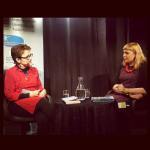


Secondly, it was an absolute privilege to get to share just a little of the Northern Irish story with both school children and festival attendees at SILK Literature and Cultural Festival last night. I’m not the world’s most informed person when it comes to politics and I’m not sure I did the best job representing the very complicated story of what’s happened back home and what might or might not happen in the future, but I was absolutely astounded by how informed Norwegians were about the history of Northern Ireland, how interested they were and especially the respectful attitude I was shown throughout. It’s one thing sharing stories of conflict and resolution with grown adults. It’s another sharing the same narrative with a room full of teenagers and finding them incredibly interested, empathetic and eager to discuss what they might learn from our situation. It’s very humbling to be received with such warmth and wisdom. I wasn’t expecting to encounter this in the schools and am now a little in awe of the way young people are taught in Norway. Maybe I just encountered a particularly exceptional bunch of kids. Maybe the Norwegians are particularly good at nurturing wisdom, and creativity and humanity in their children.


My final highlight of the week was getting to read and talk about my life and writing practice at SILK festival last night. I was part of a Northern Irish themed night and was interviewed by journalist Rosie Goldsmith. Our chat was followed by a wonderful talk from Norwegian journalist, Annette Groot who was regularly deployed to Belfast to cover news stories during the Troubles. Afterwards we spent some time together in the Green Room talking, swapping stories and drinking wine. It was a pretty inspiring sort of conversation. The wine helped but there was a lot of wisdom flowing round the table. Once again I was struck by just how fortunate I am to get to do this for a job. I may be tired. I may not be raking in the millions. I may be up at the crack of dawn and off to another country again tomorrow, but I can’t think of anything I’d rather be doing with me Thursday night than sitting round a table learning from a bunch of wise and talented women who’ve managed to exercise influence all over the world. It’s not just a one off occurrence either. The same sort of situation keeps repeating itself every time I travel somewhere for something bookish. What a way to be living. Thankful. Inspired. Absolutely exhausted. Onwards to New Zealand where the adventure continues.


October 27, 2017
Postcard Stories for Hannah: Instalment Three
[image error]
28th September 2017
San Francisco Museum of Modern Art
Dear Celeste Boursie-Mougenot, I have no idea who you are. I assume from your name that you are French, or perhaps French Canadian, which is somehow more exotic in my eyes. I have read in the gallery notes, here at the San Francisco Museum of Modern Art, that your installation is entitled Clinamen v.3 and that this is a Latin term used by the Roman philosopher, Lucretius to describe the unpredictable swerve of atoms in his poem, On the Nature of Things. I have to confess that before reading these gallery notes, I was under the impression that Lucretius was a contemporary hip hop artist, popular with the young.
Celeste Boursie-Mougenot, can I apologize for not knowing you or your cultural references, and assure you that this has in no way undermined my enjoyment of your beautiful installation: one hundred or so white, China bowls of various sizes, floating in a pool of clean, blue water; individual vessels singing like struck glass when the current tips one into another? Can I also say that the sound these China bows made as they tingled into accidental music had me frozen for upwards on half an hour, and that I did not, during this period, feel unpredictable or swerving in front of you or your art, only astonished by the slow and gentle realization that most things in life –myself included- will eventually find their settling point.
30th September 2017
Salt Lake City
Rebecca Solnit writes, “if libraries hold all of the stories that have been told there are ghost libraries of all the stories that have not,” which makes you think of all the hundreds and thousands of handwritten books donated to the fictional library in Richard Brautigan’s seminal, American novel, “The Abortion.” Books about growing flowers by candlelight in motel rooms, and lost childhood toys, and so many small, but nonetheless remarkable, American lives, gone unnoticed, which makes you remember that no one ever checked out any of the handwritten books in Brautigan’s fictional library, though the librarian kept watch over them night and day, consuming endless cups of instant coffee for sustenance, which makes you realise that most people are only interested in reading stories similar to their own, or stories so far removed as to offer escapism, which brings you back to Rebecca Solnit and her ghost libraries, and the sad realization that if we cannot even keep the real card and paper libraries open, there seems little hope for the libraries which are only just an outlined idea of themselves.
20th October 2017
QFT, Belfast
It is 1994. You are fourteen years old. You eat and sleep and watch television. If given the chance, you’d sleep a little more. Meanwhile, on the other side of the planet, Alvin Straight is driving his sit on lawnmower, at a steady pace of five miles per hour, from Iowa to Wisconsin, in order to make amends with his dying brother. If you were to begin walking at a similarly steady speed of five miles per hour, keeping pace with Straight, and he kept motoring slowly East, and neither of you paused to sleep or pass out from exhaustion, you would eventually come face to face with each other somewhere in the middle of the Atlantic Ocean approximately two and a half weeks from now.
Alvin Straight is a seventy four year old man with shoddy hips and emphysema, but you would not put it past him. He is the most stubborn and tenacious of men. You, on the other hand, are a lackluster teenager. You are only interested in eating and sleeping and television. You probably wouldn’t adventure West, even if you had a sit on lawnmower to carry you.
25th October 2017
John Hewitt Pub, Belfast
Nobody remembers Mabel from Alice in Wonderland. They remember the Mad Hatter, the Cheshire Cat, Alice, of course. It is all about her. But, nobody remembers a girl named Mabel, a girl so mediocre, so very forgettable, Lewis Carroll does not even credit her with a walk-on role. Blink and you’ll miss Mabel in only one scene. She’s the girl Alice mentions when she’s stuck in the hall, waiting to drown in a rising tide of her own damp, tears.
“Such a situation,” Alice mumbles, “I feel so very unfortunate, I thought for a moment I might actually be Mabel.” Maybe the reader sides with Alice at this point. She’s not the nicest girl in literature –no Pollyanna, Pippy Longstockings, Anne of Green Gables- but there’s something about the way she roars which sounds like any one, or all of us, caught up in a desperate pickle. Or, maybe the reader’s run out of empathy for Alice. Maybe they’re just lousy with the thought they might be someone else’s Mabel, another more fortunate soul’s, ‘there but for the grace go, I.’


October 26, 2017
Further Adventures in Crime Fiction
[image error]
This Saturday I’ll be chairing my very first crime fiction panel as part of the fantastic new Noireland crime fiction festival in the Europa Hotel. I’ll be chatting about identity and all things crime-related with Stella Duffy, Adrian McGinty, Abir Mukherjee and Louise Welsh. I’m biased but I think it’s going to be one of the best bookish conversations of, what already looks like, a fantastic literary festival. If you don’t have a ticket yet you should probably think about acquiring one quickly. For the last month or so I’ve been preparing for this panel, reading pretty much nothing but crime fiction. It’s been a bit of a mind switch for me, adjusting from the literary fiction and essays I usually devour, to a very different kind of writing, but I have to say I’ve enjoyed the experience immensely.
I’d forgotten how much I loved crime fiction. As a young reader, having exhausted the children and young adult’s section of Ballymena library, I devoured Sherlock Holmes, then swiftly moved on to Ruth Rendell, Colin Dexter and a lifelong infatuation with Agatha Christie. In the last few years I’ve neglected my first love, only very occasionally dipping into the crime fiction genre to read the odd piece of crime fiction which kind of also sits in the ordinary fiction camp, (Emma Healey’s Elizabeth is Missing, and Graeme Macrae Burnet’s excellent, His Bloody Project).
I’m grateful to David and the team at No Alibis, for forcing me back to the crime fiction section. I’ve been guilty of a certain amount of snobbishness when it comes to this genre. Yes, it’s fair to say there’s a decent amount of terrible crime fiction in circulation, but in all honesty, there’s also a fair amount of shite out there trying to pass itself off as literary fiction. In the name of research I’ve read about ten crime fiction novels in the last few weeks, (I’ve also watched four episodes of Poirot, an episode of Shetland and that Jo Nesbo film about the snowman serial killer, but that was mostly for fun), and while I wouldn’t say I’m quite ready to pick up my pen and write something murderous, I am definitely impressed by the quality of what I’ve read. I will read more crime fiction in the future. I will repent, for judging an entire genre, on the back of a few ropey experiences and one too many episodes of Midsomer Murders. Here are a few things I learnt during my brief foray into the world of crime.
Do not judge a crime fiction novel by it’s cover. Much like poetry collections, a crime novel with a terrible cover, (blood-dripping knives, murderous silhouettes, early 90s fonts and high-gloss paper), will sometimes, despite its own attempts to scupper itself, contain really good writing.
Similarly, do not judge a crime fiction novel by its title. There’s nothing a crime fiction writer likes more than a bit of pun-based wordery when coming up with a killer book name. If Books Could Kills. Dead and Breakfast. Some Like It Shot. (Copyright me). If only it was possible to cross a crime fiction writer with a hairdresser, the pun potential would go through the roof. Curl up and Die would only be the beginning of it.
Crime fiction novels are all enormous. I know. I hauled eight of them round America for two weeks. As you all know I like to rate literary genres according to good value for money, (I am from Ballymena after all), and therefore, feel compelled to point out that for the same price, (often less) than a poetry collection, (average size 80 pages), you can acquire 400 pages of crime fiction. This means that crime fiction is five times better value than poetry. Not saying you shouldn’t read poetry. Just saying you get more words for your buck with a crime novel. More bangs too.
It is perfectly acceptable to be an upstanding member of the community and still read hideously violent crime novels in public settings. Whilst I was subject to really weird/creepy/judgmental looks when reading Bukowski, openly on the bus, I have seen many very ordinary looking elderly men and women, devouring books which I now know to be full of violence, and filth, and violent filth, in coffee shops and on the train. They don’t even look mortified when I catch their eye. I am not sure what this means. I intend to investigate further.
Val McDermid is to crime fiction what Joseph O’Connor is to Irish literary fiction. Her name has appeared on the back of all but one of the books I’ve read in the last few months. She seems to be endorsing approximately five crime novels per hour. I love Val McDermid. I once heard her say she’d run out of historical Scottish buildings to murder people in. I am perfectly happy to believe she is both prolific and omnipresent, like God or the tooth fairy.
Crime fiction isn’t all about mysteries and murders. Turns out there are about a million different genres of crime fiction. Some of them don’t even contain a corpse though I have to say I prefer the ones where people actually get murdered in a cryptic and somewhat ingenious -but not overly violent- way. I also like it when the crime is completely solved by the end of the book and the bad guys are brought to full justice. (Did I mention, I don’t like it when things get overly violent?) I do not know the name for this genre. I suspect it might just be Agatha Christie.
There is no such thing as an unflawed detective. Dodgy detectives are what keep plot lines interesting. There’s an almost infinite number of ways to scupper a good detective – alcoholism, anger management issues, old war injuries, sex-addiction, bad haircuts, a tendency to sleep through the morning alarm- any, or all, can be employed to remind the reader that the detective is fighting an ongoing battle against both crime, and his, or indeed her, own inner demons. I keep wondering what an unflawed detective would look like. Maybe the crimes would get solved quicker. This would probably make the books shorter, which would not be quite as good value for money. Down with that kind of thing.
Booking information and full programme for Noireland is available here


October 22, 2017
Happy Miracle Day Everyone
[image error]
Exactly one year and two days ago, whilst en route to Dundee Literary Festival, I left my laptop with everything I’ve ever written on it at a table in the Edinburgh Waverley Station branch of Costa Coffee. It was backed up. (I’m not that stupid). Only problem was the external hard drive with all the back ups was inside my lap top case. (I am absolutely that stupid). Through a fortuitous, some might say miraculous, serious of events, the laptop was returned to me intact exactly one year ago today. There were tears. There was much joy. There were many, many extra backing up devices received as Christmas presents last year. If you don’t know the full story you can read a short blog about it here.
A lot has happened in a year. I’ve learnt how to religiously back up my work every time I finish a writing session. I’ve taken to wearing my laptop strapped to my body, like a particularly clingy kind of child, every time I leave the house. Very excitingly, the manuscript feared lost in the debacle has found a publisher home and will, if nothing similarly disastrous happens, be appearing at some stage in early 2019. (More about that later). I’ve even conquered my fear of Waverley Station, though it took strong coffee and the company of Sinead Morrissey to walk me through my post-traumatic flashbacks. All is well in the world of lost laptops and public transport, but I’ve decided to repost this wee blog anyway and I think I will, every year on October 22nd, and I’ll probably continue to refer to this date as Miracle Day in my head for a number of reasons.
I have a really clear memory of phoning home from a hotel room in Dundee on October 20th and saying, “another bad thing has happened. I’ve lost my laptop. It’s pretty awful, but I guess I’ll get through this too.” Last Autumn wasn’t a terribly good time for me. I was miserable at work. I was permanently exhausted. I was trying to maintain a house that was much too big for me and struggling with writers’s block and all manner of other, not-exactly-life-ruining-but-still-pretty-rubbish situations. When I look back now, I realise that October 22nd was exactly the point where everything started to change for the better. Some of the difficult situations rectified themselves. I also made some big, but ultimately really great, life changes. However, more importantly something inside me just took a turn for the more hopeful on the afternoon of October 22nd. I really thought I’d never see any of my writing again. I thought I’d have to star again building up my word. I was resigned to being disappointed. The previous year had taught me how to soldier on through one mediocre situation after another and I was pretty good at things going wrong. Then, all of a sudden, two complete strangers are fishing my laptop out from down the side of a dishwasher, and I am suddenly reminded that everything doesn’t always turn out terrible in the end, that tiny, little miracles and bloody, great enormous ones, are inclined to happen all the time and perhaps, in the future, I should hold myself in the posture of anticipating fortuitous success, rather than crushing disappointment. I wish I hadn’t had to lose my laptop to learn this, but hey ho, it was well worth the experience. As I said, it’s always going to be Miracle Day, for me; a timely reminder to keep my chin up even during the direst of circumstances.
In some weird way, it was also Miracle Day for a bunch of other people too, many of whom I don’t even know. I was absolutely blown away by how many friends, strangers and members of the transport police, immediately jumped in to offer assistance when my laptop first disappeared. Messages, Tweets, phone calls and offers of help were came flying in from all roads and directions. (I shall tactfully ignore those individuals who immediately asked why I hadn’t backed my writing up more thoroughly – SYMPATHY FIRST, JUDGMENT LATER PEOPLE!!!). However, it was when we found the laptop that I actually got some sense of how many people were emotionally tied up in the hunt. I got nearly 400 likes on Facebook, 125 happy comments, 15 shares, spawning hundreds more likes from people who are complete strangers to me. I’ve posted some pretty sweet news in the past, but I’d have to come back from the flipping dead or something, to get that much positive attention again. For weeks after, friends were stopping me to say how happy they’d been to hear everything had turned out ok. Strangers approached me at events and asked, “are you the lost laptop girl?” and I didn’t even mind that I was now more famous for losing my stupid laptop than writing books. Everyone said the same thing. A kind of paraphrased version of, we really thought you weren’t going to get it back. We’re so happy you did. Makes you think that good things still happen. Or to quote, the lovely Gerard Brennan directly, “Faith in humanity restored. This really cheered me up.” Thanks extended community. I really appreciated everything you did to help, and the timely reminder that we’re all a little more connected than we think we are.
The world is arguably even more screwed up than it was this time last year but I’m still going to celebrate Miracle Day anyway because a. the wonderful souls, who are doing their best to help, still outnumber the bastardly elements and b. really, really good things can still happen every so often and when they do, you need to shout about them, just in case someone else needs a timely reminder. So, Happy Miracle Day everyone. I hope you find a fiver you’d forgotten about in your jeans, (before you wash them). I hope you win that short story competition you entered six months ago and have forgotten all about. I hope the really hot man, is in the seat next to you on your next Easyjet flight. And I hope your lost laptops always come home to you, (though it might be best not to tempt fate, and back that novel up anyway).


October 9, 2017
Postcards from America Instalment 2
[image error]
3rd October 2017
Emma Wright
Chinese Gardens, Portland
In the Chinese Gardens I learn that plum, bamboo and pine are collectively known as the Three Friends of Winter and serve to remind us to persevere. The plum brings the cold of winter to blossom. The pine remains green throughout the cold season, and the bamboo bends in storms but does not break. We are sitting in the tea room drinking tiny thimbles of tea when I learn this. I read the passage in question aloud from the visitors’ brochure. We have just been talking about the possibility of writing some poems even though you are a prose writer and I am a prose writer and neither of us has written any poetry since high school.
“I could write a poem about the Three Friends of Winter,” I say. “There’s plenty of material here to work with.”
“Leave it be,” you say. “It’s poetry just as it is.”
So, I add line breaks and a handful of commas and call it a found poem and everyone comments on how profound and poignant it is –particularly the bit about the bamboo not breaking- and I take their compliments and suck them dry, and all the time feel as if I am cheating.
4th October 2017
Hilary Copeland
Hawthorne, Portland
When I lived here I knew every single street in this city and could recite their order like a skipping rhyme. Ankeny. Burnside. Couch. Division. Everett. Flanders. Glisan. On and on until the impetus to keep everything in alphabetical order ran out, giving way to diagonal streets, and freeways, and the grassy kingdoms crouching on the city’s edge. Now I cannot get any further than Couch and have taken to pronouncing it like it is an item of furniture, rather than a word which rhymes with hooch. How sad. How tragic even. I can’t even bring to mind Division which was once of my favourite of the vertical streets because its name seemed such an apt description of a street reduced to overgrown parking lots and empty retail units. Divided and dividing again the further from town you drove. Now I do not know this place and it is impossible to tell if I have changed or the city has lost itself in my absence.
4th October 2017
Roisin O’Donnell
Powell’s Bookstore, Portland
I have developed a strange, new tick. When travelling alone I visit local bookstores and drift up and down the aisles, head cocked at a jaunty angle, looking for the sideways names of people I actually know printed on the spines of mostly paperback -but occasionally hardback- novels. I touch these books tenderly in a way I would not dare touch the actual person, resting a finger or two on the front cover, deferring blessing. Sometimes I sigh softly as if to infer that it is a relief of sorts to find companionship so far from home. I kid myself into believing the people I actually know will sense they are being thought about fondly though I am many thousand miles from them. If I am feeling especially bold or lonely, I will move the books of people I actually know to the staff picks section of the bookstore, or the display unit reserved for bestsellers. I do not actually know anyone in the bestsellers section but maybe some day soon I will have actual bestselling friends. If this does happen I am not sure how I will best serve their interests when passing through far flung bookstores and airport book vendors. Maybe I will stand beneath their displays and coerce undecided readers into purchasing the books of people I actually know. Maybe I will be too jealous to bother.
5th October 2017
Laura Kavanagh
Los Gatos, California
There is a noise coming from the room directly beneath yours. All night long it sings through the floorboards, and the sound of it is like very many raincoats endlessly unzippering, all at once. It is a kind of insect hum. On the first and second nights of your stay you try to ignore this noise. It takes you hours to fall asleep and when you do, you finally understand why they call it dropping off. You are constantly bracing yourself against the fall. You are sleeping, and shallow dreaming, and suddenly lurching back to fully awake. The third night you decide to investigate where this noise is coming from.
You take a torch, though a torch is hardly necessary in such a well-lit hotel corridor. You find the room directly below yours. The door is propped open so you can see this room is full of plump, little old ladies, like cartoon hedgehogs, hunched over their sewing machines. There must be fifty of them in the room at least. There may even be as many as a hundred, hemming large pieces of floral print fabric.
“What are you doing?” you ask one sewing lady and she explains that they are making black out curtain for every guest room in the hotel. “So the guests will sleep well,” she says. Every selfish, sleep-deprived bone in your body wants to smash her sewing machine into pieces with a spade. But there are so many sewing machines to be silenced, and it is already 3am, and you know the adrenaline associated with such efforts will only keep you up even longer.
6th October 2017
Orla McAdam
Los Gatos, California
Two squirrels are chasing each other across the motel lawn. The first is the same brown colour you’ve seen in hometown squirrels. The other is such a rare shade of grayish, black you’re unsure whether it is actually a squirrel, or just a rat with an exceptionally bushy tale. The squirrels dart backwards and forwards flirting with the drizzled edge of the sprinkler’s reach. Occasionally they change direction and twist themselves, like Christmas tinsel, around the legs of the poolside sun loungers. Their chase culminates in a frantic, two squirrel sprint up the side of a palm tree. Their tiny claws, catching on the palm tree’s bark, make the same rasping sound as something hard being grated: nutmeg for example, or baking chocolate. Once both squirrels have reached the upper limit of the palm tree they disappear into its leafy fronds. You stand beneath this tree for a few minutes, hand cupping your eyes against the sun as you try to locate your squirrels. The whole tray sways gently in the breeze. It is like a tall man standing with his feet too close together. You are pretty sure that this will be both the first and last time you see a squirrel in a palm tree.
7th October 2017
Rachel McCrum
Los Gatos, California
This afternoon the poets are reading in a red-walled art gallery. They have been arranged on stackable chairs on a kind of mezzanine level. A bronze bust of a horse’s head peers through the window to their right as if the horse had turned up late for the reading and could not get a seat and had to content itself with peering through an open window.
Down below on the ground level, the gallery attendant welcomes visitors to the exhibition. “Is this your first time in the gallery?” she yells. She’s more than a little hard of hearing. The poets raise their voices in competition with this woman. She ups her volume level. The poets acquire a microphone. Everything is loud and clamouring for the ear’s attention.
Everything but the horse, who does not speak. Possibly because he has nothing to say. Possibly because his lips are soldered shut. You look at the horse. The horse looks at you. You have empathy for the horse. Also sympathy. You have feet. You can get up and leave any time you want. Without feet, or legs, or anything beyond that elegant, bronze neck, the horse is stranded here with the poets, and the microphone, and the loud, shouting lady downstairs.
8th October 2017
Reidunn and Odd Henning
San Francisco Airport
Terminal Two of San Francisco airport currently contains a small exhibition on the history of the typewriter. You pause on the way from Portland, Oregon to San Jose, shrug your backpack –rock heavy with books- off your shoulders, and wander from display case to case reading the story of Ernest Hemmingway and Tennessee Williams and even John Lennon’s typewriters, all of which are captured here and displayed behind plate glass, like rare beasts hauled home from safari.
You are particularly drawn to Tennessee Williams’ typewriter. There is a copy of Cat on a Hot Tin Roof framed right next to it. You know this play back to front and inside out, also Streetcar. You lay your hands against the glass roof of the case, placing them carefully over the typewriter’s keys so your hands, with their chubby fingers and gnawed nailed, might be Tennessee Williams’ hands, and you wonder if a typewriter can hold memory like the feet of your friends with Dementia have retained the memory of quickstep and foxtrot, long after the word for dancing has passed them by.
You hover your hands over this typewriter for so long other people begin to jostle for a look. You are wondering whether your fingers, if permitted to pass through glass and rest upon the actual typewriter, might play it like a piano, might cause the keys to sing from memory: deep south nights, and whiskey cures, and strangers offering dreadful kindness.


October 8, 2017
Travelling, Writing, Mostly Failing
[image error]
These days I am spending about a third of my time on the road. I’m not complaining. It’s such a privilege to get paid, (albeit not very much), to do what you love and when you get paid to do what you love in an exotic location like Belgium, or California, or Norwich, well it’s like Christmas, Birthday and a new season of Casualty all rolled into one. Traveling so much poses a few challenges for me, mostly self-inflicted: propensity to purchase too many books whilst travelling and consequently break my back hauling them from one town to the next, tendency to eat enormous breakfasts when staying in hotels then forget to eat lunch and by seven o’clock find myself jittery and migrainous from sugar low, occasional bouts of crippling homesickness, missing many episodes of Casualty, so many they are no longer even available on the Iplayer etc. However, the biggest challenge for me has been attempting, (and mostly failing), to adjust my mindset to what travelling means these days.
Before I started traveling for literary events, airports equalled adventure, hotels were associated with luxury, and I couldn’t get enough of buffet breakfasts and tiny little one use bottles of shampoo and conditioner. I had an almost insatiable appetite for meeting new people. I truly enjoyed taking myself and a good book out for dinner alone. I adored trains. I still love all those things in moderation, but for me, travel has morphed into a very different experience over the last few months. I am almost never on holidays when I travel now. I am heading to a literary festival to read, or going somewhere to teach workshops. I am also still on the clock for part time jobs I work back home. Almost all working writers make so little money from book sales they have to juggle other jobs and income sources in order to survive. Mortgages and electric bills don’t pay themselves while we’re on the road reading and I’ll often come across people, like myself, who are working remotely at a part time job, while they’re traveling from one literary event to the next. On top of this, there is the always pressing, guilt-inducing, constantly itchy need to be writing. This has only just occurred to me as a problem this year. If I’m to be on the road promoting one book, which probably won’t generate enough income to give up my part time jobs, I still have to keep writing away at my next manuscript, trying to immerse myself in its plot and characters whilst flitting about all over the place. This can sometimes -particularly over the summer when it’s festival season- mean working the equivalent of two full time jobs while you’re in almost constant transit. I’m honestly not complaining. It’s a privilege etc etc. But you can see where the glamourous side to all this travel hits up against the reality of hard work and, almost constant low-level exhaustion. Just being sociable every day for weeks on end with strangers is pretty tiring.
I’m leaving America this afternoon. I had high hopes for this trip. I would not treat it as a holiday. I would get up early. I would write for two hours each morning, then do admin for two hours. I would fulfil my obligations at various readings and literary events. Whatever time was left I would allow myself to use for leisure, tourism and the consumption of pancakes or beer. I would also read ten books in preparation for the interviews and talks I am committed to host over the next few months. And I would write a Postcard Story every day. And I would rest.
Hmmmm. It was a nice plan, if somewhat overly ambitious. I have had a thoroughly lovely time in America. I have ticked my boxes on Postcard Stories and the consumption of beer and pancakes. I have just about managed to keep up with all my admin from home, occasionally crouching outside closed Starbucks to patch into their WiFi and send emergency emails home, often staying up til one and two in the morning to get paperwork completed after events. I have not written anything, though I have so many new ideas for short stories, I will now be guilt-induced about not writing these stories for several months to come. I have not read the books I was meant to read for forthcoming events and have, instead, blown my carefully prepared budget on millions of other books which seemed more interesting at the time. I am now developing back ache from carting these books around airports and train stations. I have not rested though I have met lots of wonderful new people I did not know before.
I am, in short, failing at the whole, traveling and writing at the same time thing. Which would be fine if I didn’t have another eight trips for readings to fit in before the middle of December. I am feeling a little anxious. Not defeated. Just slightly concerned. This isn’t one of those blogs where you get answers. It’s more of a half-hearted cry for help. Does anyone have any suggestions for being productive whilst spending a serious chunk of your time in transit? Does anyone know how to sleep on a long haul flight and not wake up feeling completely hungover? How many trees should I be planting to compensate for all these flights? Not complaining. Privilege etc etc. But v. tired.





